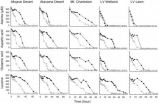(Press-News.org) Las Vegas - A study published recently in PLOS ONE authored by Dr. Henry Sun and his postdoctoral student Dr. Gaosen Zhang of Nevada based research institute DRI provides new evidence that Earth bacteria can do something that is quite unusual. Despite the fact that these bacteria are made of left-handed (L) amino acids, they are able to grow on right-handed (D) amino acids. This DRI study, funded by the NASA Astrobiology Institute and the NASA Exobiology Program, takes a closer look at what these implications mean for studying organisms on Earth and beyond.
"This finding is important because D-amino acids are slowly produced in soils through geochemical transformation of L amino acids. If they were allowed to accumulate, they would poison the environment for plants and animals. Our research shows that it is the bacteria that prevent D-amino acids from accumulating to toxic levels," explains Dr. Sun, who has studied microbial life in extreme environments in the Antarctic dry valleys, the Atacama Desert, and Death Valley.
Amino acids, the fundamental building blocks of life, come in two forms that, like our left and right hand, have identical parts. But the two forms are not the same from a three dimensional perspective. One is the mirror image of the other. Proteins and enzymes in Earth organisms, without exception, all use L-forms. As expected, soil bacteria are very efficient at consuming L-amino acids from the medium. The researchers then presented the same bacteria D-amino acids. To their surprise, these life-incompatible forms too were rapidly consumed.
"We are not saying that the D-amino acids are assimilated as is. If incorporated into proteins, this amount of D-amino acids would kill the organisms," says Dr. Sun. "Rather, we think that a conversion occurred in the bacteria that turned the D-amino acids back into L-forms. All bacteria carry a specialized enzyme known as racemase which converts amino acids from one form to another," adds Dr. Sun.
This then raises another question: If all organisms on Earth synthesize L-amino acids, where do D-amino acids come from? Amino acids have the property of being able to spontaneously flip from one form to another, a process called racemization. Racemization is very slow. Most organisms do not live long enough for this process to kill the proteins and, ultimately, the organisms themselves. In soils, however, amino acids can be sequestered for thousands or even millions of years, allowing racemization to accumulate. Eventually, the concentrated D-amino acids are released into the environments – to the waiting bacteria, rather than poisoning plant and animal life.
Bacteriologists have known that bacteria contain racemases, but they have always assumed that the enzymes were invented for making D-amino acids. Unlike plants and animals, bacteria need a small amount of D-amino acids, not to incorporate into proteins, but to incorporate into cell walls to increase resistance and stability.
"But this cannot be the reason that bacteria invented the racemase. If D-amino acids are toxic, you have to invent a detoxification mechanism first before you go around and make more of the stuff. We think it is much more likely that the racemase originated initially as a detoxification enzyme. Only later, do bacteria, now immune to D-amino acid toxicity, start to make D-amino acids for constructive purposes. The D-amino acid-making function, therefore, is a secondary biological invention," says Dr. Sun.
"The implications of our study go beyond Earth. The steps that led to the invention of racemases on Earth would also exist on other planets, even if life uses D- instead of L-amino acids. This means that D-bacteria would also have to invent racemases and, as a result, would consume L-amino acids for nutrients. This creates a scenario that scientists charged with the duty of protecting Earth from foreign organisms haven't thought about," says Dr. Sun. "If D-bacteria ever visit us on Earth, they would compete with native bacteria for nutrients," he adds.
INFORMATION:
All DRI news releases are available at news.dri.edu
Note to Reporters and Editors: DRI, the nonprofit research campus of the Nevada System of Higher Education, strives to be the world leader in environmental sciences through the application of knowledge and technologies to improve people's lives throughout Nevada and the world.
Bacteria get new badge as planet's detoxifier
DRI scientists investigate the link between right-handed and left-handed amino acids
2014-04-04
ELSE PRESS RELEASES FROM THIS DATE:
Knowledge, use of IUDs increases when women are offered counseling and 'same-day' service
2014-04-04
PITTSBURGH, April 3, 2014 – Health care clinics should routinely offer same-day placement of intrauterine devices (IUDs) to women seeking emergency contraception, according to researchers at the University of Pittsburgh School of Medicine. The study findings, published online in the journal Contraception, demonstrate that providing patient education along with same-day placement service increases both knowledge and use of IUDs three months and a year after women seek emergency contraception.
"Women seeking emergency contraception, who are at very high risk of undesired ...
Researchers empower parents to inspire first-generation college-goers
2014-04-04
(PHILADEPHIA) – Parents who have not attended college are at a disadvantage when it comes to talking about higher education with their kids – yet these are the students who most need a parent's guidance.
A new approach developed and tested by researchers at University of the Pacific's Gladys L. Benerd School of Education may help solve the problem. It was presented today at the annual meeting of the American Educational Research Association. [April 4, 8:15 a.m. EDT, Philadelphia Convention Center Terrace Level, Terrace IV]
"There is a common perception that low-income ...
The Trayvon Martin case: Lessons for education researchers
2014-04-04
CHESTNUT HILL, MA (April 4, 2014) – The 2012 fatal shooting of black teenager Trayvon Martin by his Florida neighbor George Zimmerman sparked a fierce debate about racism and gun violence. Now, researchers are exploring what the controversial case says as well about sexism and violence against women.
Boston College Lynch School of Education Professor Ana M. Martinez Aleman spoke today at the American Educational Research Association annual conference in Philadelphia about the highly politicized debate surrounding the Martin case and the implications for researchers who ...
New risk factors for avalanche trigger revealed
2014-04-04
The amount of snow needed to trigger an avalanche in the Himalayans can be up to four times smaller than in the Alps, according to a new model from a materials scientist at Queen Mary University of London.
The proposed universal model could have implications in better understanding strategies for mitigating natural hazards related to snow and rock avalanches and safeguarding people on mountain villages, roads and ski resorts.
By using a branch of mechanics that aims to understand how cracks spread in solid structures, Professor Nicola Pugno from Queen Mary's School ...
Some long non-coding RNAs are conventional after all
2014-04-04
HEIDELBERG, 4 April 2014 – Not so long ago researchers thought that RNAs came in two types: coding RNAs that make proteins and non-coding RNAs that have structural roles. Then came the discovery of small RNAs that opened up whole new areas of research. Now researchers have come full circle and predicted that some long non-coding RNAs can give rise to small proteins that have biological functions. A recent study in The EMBO Journal describes how researchers have used ribosome profiling to identify several hundred long non-coding RNAs that may give rise to small peptides.
"We ...
'Like a giant elevator to the stratosphere'
2014-04-04
Recent research results show that an atmospheric hole over the tropical West Pacific is reinforcing ozone depletion in the polar regions and could have a significant influence on the climate of the Earth.
An international team of researchers headed by Potsdam scientist Dr. Markus Rex from the German Alfred Wegener Institute has discovered a previously unknown atmospheric phenomenon over the South Seas. Over the tropical West Pacific there is a natural, invisible hole extending over several thousand kilometres in a layer that prevents transport of most of the natural and ...
Guelph researchers solve part of hagfish slime mystery
2014-04-04
VIDEO:
This video shows the internal structure of developing gland thread cells in hagfish slime.
Click here for more information.
University of Guelph researchers have unravelled some of the inner workings of slime produced by one of nature's most bizarre creatures – hagfish.
They've learned how the super-strong and mega-long protein threads secreted by the eel-like animals are organized at the cellular level. Their research was published today in the science journal Nature ...
Swedish researchers show impact of long-term vitamin D insufficiency on fracture risk
2014-04-04
A study presented today at the World Congress on Osteoporosis, Osteoarthritis and Musculoskeletal Diseases shows that long-term low levels of vitamin D intake are associated with higher 10-year fracture risk in elderly women.
Vitamin D insufficiency in seniors has been shown to contribute to increased risk of osteoporotic fractures. Previous studies have used single vitamin D measurements to investigate effects on bone. However, in elderly women, relatively little is known about the effects of long-term vitamin D insufficiency on bone health.
The study by Swedish researchers ...
Good Knives Announce May UK Tour Dates
2014-04-04
Rock band Good Knives announced today their upcoming UK tour, set to kick off May 1 in Cambridge, England. With intercontinental members hailing from the UK and the US, the band is touring in support of their new album "A Place Called Doubt," and will be releasing a new music video for their single "Heart Is Cracked" mid-April.
Good Knives is composed of vocalist Shaunny P, guitarist Duffs (Ex Love Equals Death), bassist DJay Brawner (Wiggum), and drummer Ray Blanco (The Bangkok Five, Hometown Hero).
Good Knives UK Tour May 2014 dates are listed below:
5/1 Corner ...
Nick and Javier Montoya Appearing at Citadel Plaza
2014-04-04
(Scottsdale, AZ) Helping people feel better is Nick Montoya's life mission. This savvy business leader is also the creator of The Ageless Program. He and family member Javier Montoya have teamed up with Elevate Yoga Studio to treat the Glendale community to a rousing yoga, musical experience. They will be showcasing their Ageless Program offerings on Saturday April 12th at the Arrowhead Citadel Plaza.
Nick, a tenured Fortune 100 executive transformed his life through yoga and now offers executive coaching and motivational speaking, infused with healing based yoga, all ...
LAST 30 PRESS RELEASES:
The wild can be ‘death trap’ for rescued animals
New research: Nighttime road traffic noise stresses the heart and blood vessels
Meningococcal B vaccination does not reduce gonorrhoea, trial results show
AAO-HNSF awarded grant to advance age-friendly care in otolaryngology through national initiative
Eight years running: Newsweek names Mayo Clinic ‘World’s Best Hospital’
Coffee waste turned into clean air solution: researchers develop sustainable catalyst to remove toxic hydrogen sulfide
Scientists uncover how engineered biochar and microbes work together to boost plant-based cleanup of cadmium-polluted soils
Engineered biochar could unlock more effective and scalable solutions for soil and water pollution
Differing immune responses in infants may explain increased severity of RSV over SARS-CoV-2
The invisible hand of climate change: How extreme heat dictates who is born
Surprising culprit leads to chronic rejection of transplanted lungs, hearts
Study explains how ketogenic diets prevent seizures
New approach to qualifying nuclear reactor components rolling out this year
U.S. medical care is improving, but cost and health differ depending on disease
AI challenges lithography and provides solutions
Can AI make society less selfish?
UC Irvine researchers expose critical security vulnerability in autonomous drones
Changes in smoking status and their associations with risk of Parkinson’s, death
In football players with repeated head impacts, inflammation related to brain changes
Being an early bird, getting more physical activity linked to lower risk of ALS
The Lancet: Single daily pill shows promise as replacement for complex, multi-tablet HIV treatment regimens
Single daily pill shows promise as replacement for complex, multi-tablet HIV treatment regimens
Black Americans face increasingly higher risk of gun homicide death than White Americans
Flagging claims about cancer treatment on social media as potentially false might help reduce spreading of misinformation, per online experiment with 1,051 US adults
Yawns in healthy fetuses might indicate mild distress
Conservation agriculture, including no-dig, crop-rotation and mulching methods, reduces water runoff and soil loss and boosts crop yield by as much as 122%, in Ethiopian trial
Tropical flowers are blooming weeks later than they used to through climate change
Risk of whale entanglement in fishing gear tied to size of cool-water habitat
Climate change could fragment habitat for monarch butterflies, disrupting mass migration
Neurosurgeons are really good at removing brain tumors, and they’re about to get even better
[Press-News.org] Bacteria get new badge as planet's detoxifierDRI scientists investigate the link between right-handed and left-handed amino acids


